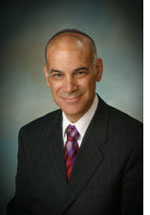By Rabbi Leonard Rosenthal

SAN DIEGO — On Wednesday I had the honor of teaching our sixth and seventh grade Ratner Torah School classes. In the sixth grade class we studied one of the original sources for the Passover Seder in the Mishna and learned that the majority of rabbis did not consider eating charoset (a mixture of fruit representing mortar) a mitzvah (religious obligation). I told the students that this is the accepted opinion today and asked them to prove it to me.
After a number of guesses I told them that we know that eating charoset is not a mitzvah because there is not blessing for it. Whereas we are commanded to eat matza and say “Praised are you Adonai our God, Ruler of the Universe, who made us holy through your commandments and commanded us to eat matza,” there is no similar blessing for eating charoset. It is a tradition.
Whether or not a behavior is a mitzvah, something commanded by God, raises an interesting question: “Why does God want us to perform mitzvot?” Does it make any difference to God whether or not we eat matza, dwell in a sukkah, or light Shabbat candles? Does our obedience in some way help or benefit God?
The answer is clearly “no.” Midrash Tanchumah addressed this question directly in explaining God’s command to Aaron to light the Menorah (lamp stand) in the Mishkan. According to the midrash, God said to Moses: “Don’t think it is because I need the light of human beings that I told Aaron to light the Menorah. Rather, it is for your sake.”
If they are for our sake, how does performing mitzvot help us?
Mitzvot help us be mindful of God and God’s goodness on an ongoing basis. Mitzvot help shape our values and morals. Mitzvot remind us that everything we do or say affects the world and those around us. When we perform a mitzvah we manifest God’s holiness on earth.
This week’s special maftir (concluding Torah reading) contains a similar lesson. On the Shabbat preceding (or in this case concurring with) the beginning of the month of Nisan we read about some of the preparations required to celebrate Pesach. The maftir begins: “The Lord said to Moses and Aaron in the land of Egypt: This month shall mark for you the beginning of the months; it shall be the first of the months of the year for you.” (Ex. 12:1-2)
This is the first mitzvah in the Torah that is exclusively directed at Jews. Up to now, and especially before the Israelites reached Mt. Sinai, the laws of the Torah were for all of humanity. This is the first time Jews are given our own commandment to help us define our own unique relationship with God.
The days and months, holy and secular, do not affect God in any way. They are not God’s concern. They are ours. We decide whether to celebrate, treasure, and sanctify the hours, days, and years with which we are blessed, or to abuse and waste them.
As we prepare to celebrate Pesach, let us also prepare our hearts and lives to better serve God and humanity.
*
Rabbi Rosenthal is spiritual leader of Tifereth Israel Synagogue. He may be contacted via leonard.rosenthal@sdjewishworld.com. Comments intended for publication in the space below must be accompanied by the letter writer’s first and last name and by his/ her city and state of residence (city and country for those outside the U.S.)